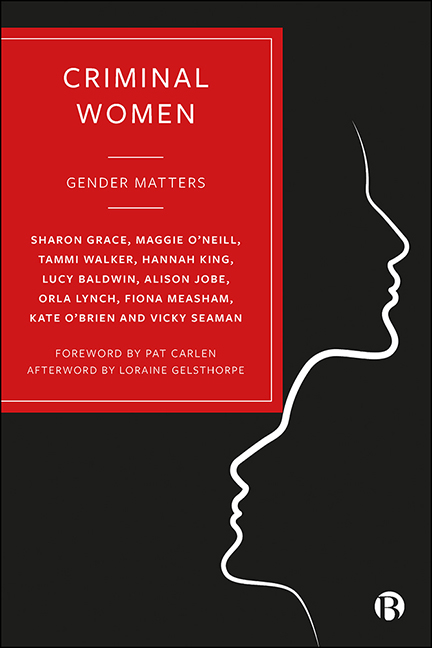Book contents
- Frontmatter
- Contents
- List of Figures and Table
- Notes on the Authors
- Acknowledgements
- Foreword
- Introduction
- 1 Hearing the Voices of Women Involved in Drugs and Crime
- 2 Knifing Off? The Inadequacies of Desistance Frameworks for Women in the Criminal Justice System in Ireland
- 3 Sex Work, Criminalisation and Stigma: Towards a Feminist Criminological Imagination
- 4 Criminal Women in Prison Who Self-harm: What Can We Learn from Their Experiences?
- 5 Criminal Mothers: The Persisting Pains of Maternal Imprisonment
- 6 ‘The World Split Open’: Writing, Teaching and Learning with Women in Prison
- 7 Women’s Biographies through Prison
- Afterword
- Index
5 - Criminal Mothers: The Persisting Pains of Maternal Imprisonment
Published online by Cambridge University Press: 15 September 2022
- Frontmatter
- Contents
- List of Figures and Table
- Notes on the Authors
- Acknowledgements
- Foreword
- Introduction
- 1 Hearing the Voices of Women Involved in Drugs and Crime
- 2 Knifing Off? The Inadequacies of Desistance Frameworks for Women in the Criminal Justice System in Ireland
- 3 Sex Work, Criminalisation and Stigma: Towards a Feminist Criminological Imagination
- 4 Criminal Women in Prison Who Self-harm: What Can We Learn from Their Experiences?
- 5 Criminal Mothers: The Persisting Pains of Maternal Imprisonment
- 6 ‘The World Split Open’: Writing, Teaching and Learning with Women in Prison
- 7 Women’s Biographies through Prison
- Afterword
- Index
Summary
Sadly, despite over 30 years of feminists and criminologists providing evidence of the repeated failure of the criminal justice system (CJS) to respond appropriately to female law breakers, very little has actually changed. The female prison population has continued to rise in tandem with supposedly progressive gender responsive reforms, and stubbornly remains between 3,000– 4,000 as of 2021 (Baldwin and Epstein, 2017). Following the publication of the recent Female Offender Strategy (Ministry of Justice, 2018), the female-focused Farmer Report (2019) and the Joint Human Rights Committee report on maternal imprisonment (UK Parliament, 2019), there exists a cautious optimism that positive change is afoot, albeit in a limited capacity. It remains to be seen if these successive publications and their recommendations will enjoy any greater success than Corston (2007). Corston, in her review of ‘vulnerable women in the criminal justice system’, made 43 valid and sensible recommendations, the majority of which were accepted by government. However, over a decade later very little progress has been made in terms of their implementation, with only one recommendation fully actioned (Women in Prison, 2017). Indeed, it could be argued that with the implementation (and failure) of the Transforming Rehabilitation (TR) agenda, women law breakers are in a worse position than ever. Despite existing international sentencing guidelines suggesting the contrary, pregnant women and mothers of dependent children continue to be imprisoned for non-violent offences, most often offences that are rooted in poverty or trauma, or both (Penal Reform International, n.d.).
This chapter echoes the style of Carlen et al's (1985) seminal text which used the individual narratives of four women to explore and highlight the failures of the CJS. In the original Criminal Women, motherhood was only lightly visited, and mainly through Christina's narrative. Christina spoke about the tensions and struggles between ‘criminality and motherhood’, recalling that during her last sentence she could hear her son crying out to her, ‘mummy, mummy’. Christina described being ‘demented with grief ‘ at their separation. When officers would not let Christina telephone him, she started ‘smashing, crashing and fighting’ and was placed in ‘punishment’, that is, solitary confinement (Carlen et al, 1985: 82). Personal narratives like Christina's (and Mary's and Cassie's presented in this chapter) highlight the importance of seeing and hearing women as individuals, rather than ‘lumping’ all women who come into contact with the CJS into one.
- Type
- Chapter
- Information
- Criminal WomenGender Matters, pp. 107 - 131Publisher: Bristol University PressPrint publication year: 2022

